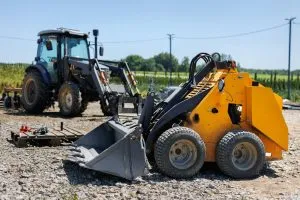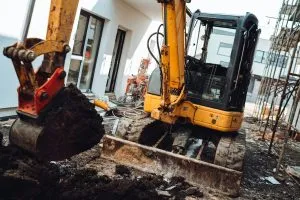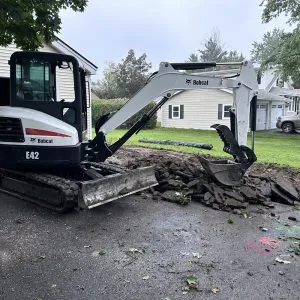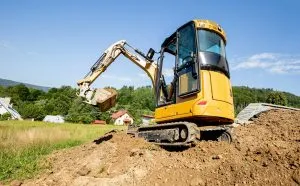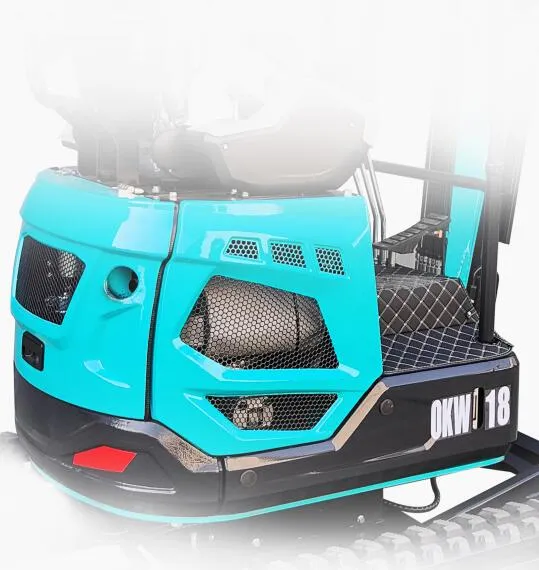Choosing between a backhoe and a mini excavator can be a tough decision, especially if you’re not well-versed in heavy machinery. Each machine has its own unique strengths, applications, and limitations. Whether you’re working on a construction site, landscaping, or even tackling a large-scale DIY project, understanding which equipment will best suit your needs is crucial.
In this article, we’ll delve into the key differences, advantages, and scenarios where one might be preferable over the other. We’ll also provide insights into operational costs, maintenance considerations, and more, to help you make an informed decision.

Backhoe vs. Mini Excavator: Understanding the Basics
Before diving into the specifics, it’s essential to understand what a backhoe and a mini excavator are and what they are commonly used for.
What is a Backhoe?
A backhoe, also known as a backhoe loader, is a versatile piece of equipment that combines the capabilities of a tractor, loader, and backhoe into one machine. It has a front loader bucket and a backhoe attached to the rear, making it ideal for a variety of tasks such as digging, lifting, and loading.
What is a Mini Excavator?
A mini excavator, on the other hand, is a smaller, more compact version of a standard excavator. It’s designed for digging, trenching, and demolishing small structures in tight spaces. Despite its smaller size, a mini excavator is a powerful tool that can be fitted with various attachments to perform a wide range of tasks.

Primary Uses and Applications
When to Use a Backhoe
Backhoes are best suited for tasks that require a combination of digging and loading. Here are some common applications:
- Digging Trenches: Backhoes are excellent for digging trenches for utility lines, drainage, or foundations.
- Loading and Unloading Materials: The front loader can quickly move large amounts of soil, gravel, or other materials.
- Road Construction: Backhoes are often used in road construction for digging ditches and laying foundations.
- Agriculture: In farming, backhoes are used for tasks like digging irrigation ditches, moving hay bales, and clearing debris.
When to Use a Mini Excavator
Mini excavators are the go-to equipment for smaller, more precise jobs. They are often used in:
- Residential Construction: Perfect for digging foundations for small buildings, patios, or pools.
- Landscaping: Mini excavators are great for shaping terrain, planting trees, or installing irrigation systems.
- Demolition: Ideal for tearing down small structures or breaking concrete in confined spaces.
- Utility Work: Mini excavators are frequently used for installing or repairing underground utilities in urban areas.
Key Differences Between Backhoes and Mini Excavators
Size and Maneuverability
One of the most significant differences between a backhoe and a mini excavator is size. Backhoes are larger and typically require more space to operate effectively. In contrast, mini excavators are compact and designed to work in tight, confined spaces.
Versatility
Backhoes are often considered more versatile because they combine the functions of a loader and a backhoe in one machine. However, mini excavators can be equipped with various attachments like augers, breakers, and grapples, allowing them to handle a wide range of tasks.
Digging Depth
In general, backhoes have a deeper digging capacity compared to mini excavators. This makes them better suited for projects that require deep trenching or digging.
Mobility
Backhoes are typically faster when it comes to moving between job sites because they are wheeled machines. Mini excavators, which usually have tracks, are slower but offer better stability and are less likely to damage the ground.

Cost Considerations: Backhoe vs. Mini Excavator
Purchase Price
The initial cost of purchasing a backhoe is generally higher than that of a mini excavator. This is due to the backhoe’s larger size and added functionality (with the front loader). If budget is a significant concern, this might steer you towards a mini excavator.
Operating Costs
Operating costs can vary depending on the type of machine, fuel efficiency, and maintenance requirements. Backhoes, being larger, tend to consume more fuel and may have higher maintenance costs. Mini excavators, while generally more fuel-efficient, may incur additional costs if multiple attachments are required for different tasks.
Maintenance
Backhoes, with their complex systems and additional components, typically require more frequent and extensive maintenance compared to mini excavators. Mini excavators are simpler machines with fewer parts, which can reduce maintenance time and costs.
Ease of Use and Operator Comfort
Operator Comfort
Backhoes are designed with the operator in mind, often featuring larger cabs with more amenities like air conditioning and ergonomic seating. This makes them more comfortable for long hours of operation. Mini excavators, being smaller, may have less spacious cabs, but modern designs have improved comfort significantly.
Ease of Operation
Mini excavators are generally easier to operate, especially for beginners. Their controls are simpler, and their smaller size makes them less intimidating. Backhoes, while not overly complicated, do require more skill to operate effectively due to their larger size and dual functionality.

Project Scope: Matching the Machine to the Task
Large-Scale Projects
For large-scale construction or agricultural projects, a backhoe is often the better choice. Its ability to dig deep and move large amounts of material quickly makes it ideal for extensive work that requires both digging and loading.
Small-Scale or Residential Projects
Mini excavators excel in small-scale or residential projects where precision is key, and space is limited. Their compact size allows them to work in areas where a backhoe simply couldn’t fit. If you’re working on landscaping, installing a pool, or performing utility work in a confined space, a mini excavator is likely the better option.
Safety Considerations
Stability and Safety Features
Both backhoes and mini excavators come equipped with safety features like rollover protection systems (ROPS) and seat belts. However, the stability of these machines differs. Mini excavators, with their lower center of gravity and tracked design, are generally more stable on uneven terrain. Backhoes, being taller and wheeled, may require more caution when operating on slopes or loose ground.
Visibility
Visibility can impact safety significantly. Backhoes offer good visibility to the front but may have blind spots at the rear due to their size. Mini excavators, being smaller, provide better all-around visibility, making them safer to operate in confined spaces or around obstacles.
Environmental Impact
Fuel Efficiency
When it comes to fuel efficiency, mini excavators usually have the upper hand. Their smaller engines consume less fuel, making them more environmentally friendly and cost-effective in the long run. Backhoes, while powerful, tend to use more fuel, contributing to higher operational costs and a larger carbon footprint.
Ground Impact
Mini excavators, with their lighter weight and tracked movement, exert less pressure on the ground. This reduces the risk of damaging the terrain, especially in sensitive environments. Backhoes, with their heavier weight and wheeled design, can cause more significant ground disturbance, which might be a consideration in certain projects.

Rental vs. Purchase: What’s the Best Option?
Cost-Effectiveness of Renting
If your need for heavy equipment is temporary or for a one-time project, renting might be the most cost-effective option. Rental rates for both backhoes and mini excavators vary, but mini excavators are typically less expensive to rent due to their smaller size.
Advantages of Purchasing
On the other hand, if you foresee multiple projects in the future, purchasing a machine could be more economical in the long term. Owning equipment allows for immediate availability and eliminates the ongoing cost of rentals. When deciding between purchasing a backhoe or a mini excavator, consider the types of projects you’ll be undertaking regularly.
Resale Value and Depreciation
Depreciation Rates
Both backhoes and mini excavators depreciate over time, but the rates can differ. Generally, mini excavators tend to retain their value better due to their versatility and demand in various industries. Backhoes, being larger and more specialized, may depreciate faster, especially if they’re not in top condition.
Resale Market
The resale market for both types of equipment is robust, but mini excavators often sell quicker and at a higher percentage of their original value. This is due to their broad applicability across different sectors, from construction to landscaping.
Which Machine Is Best for You?
Assessing Your Project Needs
When deciding whether to get a backhoe or a mini excavator, the most critical factor is the specific needs of your project. Consider the size of the job site, the type of work to be done, and any constraints such as budget, space, and environmental impact.
Consulting with Experts
If you’re still uncertain, consulting with equipment rental companies, contractors, or machinery experts can provide valuable insights. They can help you evaluate your needs and suggest the best machine for your particular situation.
Case Studies: Real-World Examples
Backhoe in Action
Consider a large farm needing extensive irrigation work. The farm’s owner chooses a backhoe for its ability to dig deep trenches and load large quantities of soil quickly. The versatility of the backhoe allows the farmer to complete the project efficiently, saving both time and labor costs.
Mini Excavator in Action
In contrast, a landscaping company working in an urban residential area opts for a mini excavator. The project involves creating a garden with intricate pathways and a small pond. The mini excavator’s compact size and precision allow the team to work in tight spaces without disturbing the surrounding environment.
FAQs
Is a backhoe more expensive than a mini excavator?
Generally, yes. A backhoe is typically more expensive due to its larger size and additional functionality.
Can I use a mini excavator for large projects?
While possible, mini excavators are better suited for smaller, precise tasks. For large projects, a backhoe might be more efficient.
Which machine is easier to operate?
Mini excavators are generally easier to operate, especially for beginners, due to their simpler controls and smaller size.
Do backhoes require more maintenance?
Yes, backhoes typically require more maintenance because they have more components and are more complex machines.
Which is better for tight spaces?
A mini excavator is better suited for tight spaces due to its compact size and maneuverability.
Should I rent or buy a backhoe or mini excavator?
If you only need the machine for a short-term project, renting is usually more cost-effective. For long-term use, purchasing might be a better option.
Conclusion
Deciding between a backhoe and a mini excavator ultimately depends on the scope of your project, budget, and specific needs. Backhoes offer versatility and power, making them ideal for larger, more diverse projects. Mini excavators, with their compact size and precision, excel in smaller, confined spaces and tasks requiring detailed work. By carefully assessing your project requirements and consulting with experts, you can choose the right machine to ensure your project’s success.


